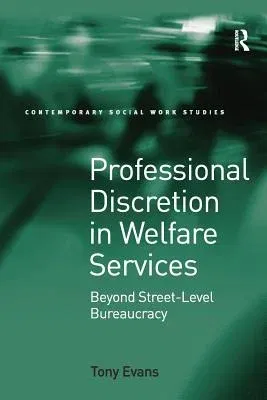Tony Evans
(Author)Professional Discretion in Welfare Services: Beyond Street-Level BureaucracyPaperback, 11 November 2016

Qty
1
Turbo
Ships in 2 - 3 days
In Stock
Free Delivery
Cash on Delivery
15 Days
Free Returns
Secure Checkout

Part of Series
Contemporary Social Work Studies
Print Length
200 pages
Language
English
Publisher
Routledge
Date Published
11 Nov 2016
ISBN-10
1138256013
ISBN-13
9781138256019
Description
Product Details
Author:
Book Format:
Paperback
Country of Origin:
US
Date Published:
11 November 2016
Dimensions:
23.39 x
15.6 x
1.07 cm
Genre:
Social Work Aspects
ISBN-10:
1138256013
ISBN-13:
9781138256019
Language:
English
Location:
Oxford
Pages:
200
Publisher:
Weight:
285.76 gm